|
Interview with Gustavo Esteva
The Society of the Different
Part 1: The Center of the World
Oaxaca, Oaxaca, Mexico
|
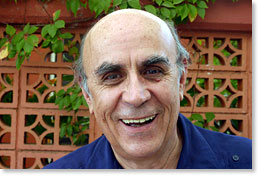 |
|
Gustavo Esteva at the Universidad de la Tierra in Oaxaca, Mexico. All photos by Nic Paget-Clarke.
|
|
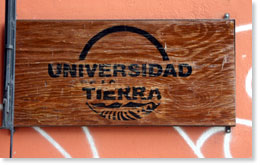 |
|
Universidad de la Tierra.
|
|
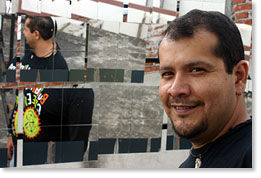 |
|
Sergio Beltran. General coordinator of the Universidad de la Tierra project.
|
|
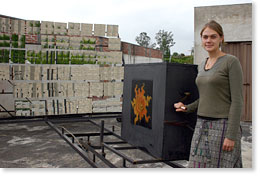 |
|
Megan Smith operating the Symington Solar Array at the Universidad de la Tierra. An example of alternative innovative technology, the array of mirrors (on the left) directs sunlight into the solar cooker (center right) to cook cacoa/chocolate and coffee beans. |
|
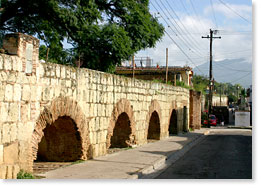 |
|
A colonial Spanish aquaduct in Oaxaca.
|
|
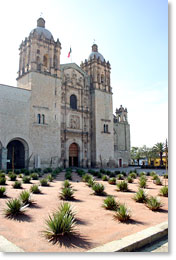 |
|
Iglesia de Santo Domingo in Oaxaca.
|
|
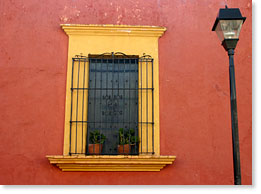 |
|
In Oaxaca.
|
|
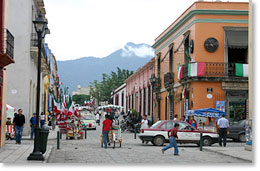 |
|
Central Oaxaca.
|
|
 |
|
A field of corn outside Oaxaca.
|
|
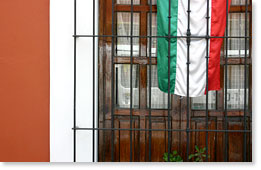 |
|
In Oaxaca.
|
Gustavo Esteva is an author, a local and international “grassroots activist and de-professionalized intellectual”, and a founder of the Universidad de la Tierra in Oaxaca, Mexico. He is also a former corporate executive, a former guerrilla, a former high-ranking official in the government of President Echeverría, and an advisor with the Zapatista Army for National Liberation (EZLN) in Chiapas for the negotiations with the government. This interview was conducted (and later edited) by Nic Paget-Clarke for In Motion Magazine on September 6 and 7, 2005 in Oaxaca, Oaxaca, Mexico.
The interview is presented in three parts and followed by a lecture given by Professor Esteva to a group of university students visiting Oaxaca from the United States. 2 | 3 | 4
Only stories make sense
Gustavo Esteva: I am Gustavo and I am presently collaborating here at the Universidad de la Tierra de Oaxaca and with the Centro de Encuentros Y Diálogos Interculturales. I helped to create them and I have been part of these two adventures. I am also part of many national and international networks. For example, INCAD is the International Network for Cultural Alternatives to Development, created in Montreal and including people from many different countries. I am also in the International Group For Grassroots Initiatives (IGGRI) created in Rome twenty years ago. Then, I am part of these kinds of networks in Mexico and elsewhere.
I usually introduce myself as a grassroots activist and de-professionalized intellectual. My friends describe, technically, my work as nomadic storyteller and that is what I do in my life.
As an introduction, if I am in a village discussing a problem, any kind of problem, with people in the village and they ask for advice about an agrarian conflict or a technical thing or a productive thing, I will never give them an advice -- to them or to anyone. But I will tell a story, a story of a similar case, of something that happened in the same condition, and then they can pick up whatever they want from it.
I can use a saying by Ivan Illich to describe that attitude. Ivan says, “Through argument you can only come to conclusions. Only stories make sense.” I am convinced of that. So, in my work I don’t give advice or present a lot of arguments but tell stories.
Truman coined the word ‘underdevelopment’
In Motion Magazine: Can you go a little bit over your personal history up to and including the relationship with the Zapatistas?
Gustavo Esteva: I got underdevelopment when I was thirteen years old, when President Truman took office and coined the word “underdevelopment”. I was one of the two billion people who that very day became underdeveloped. We were not. We were a different kind of people and suddenly we all became underdeveloped. If you become underdeveloped, it’s a very humiliating condition. Very undignified condition. You cannot trust your nose. You need to trust the experts that will bring you to development. You cannot dream your dreams because they are already dreamt. That is the model to go.
But, also, underdevelopment comes with a fascination with the idea of development. When Truman coined that word, it was the time of Hollywood and musicals. The picture that movies brought to us of the American way of life was next to paradise. So, when president Truman said, “Yes, you are underdeveloped but you can be like us. We will share with you our advances and you can have all this,” it was a Faustian promise. And we loved it. It comes with fascination. Yes, we wanted development. I wanted development. I wanted to be part of that epic. I wanted development for myself, for my family, for my country.
My Zapotec grandmother /
My Creole father
I also need to mention at this point, because this will mark my whole life, that before this instant I was very confused because of the diverse tradition of my parents. My Zapotec grandmother could not come into my house through the front door because she was an Indian. My mother assumed that the best thing that she could do for her children was to radically uproot us from any connection with our indigenous ancestry, to prevent discrimination.
In my house I heard about how the Indians were primitive, illiterate, stupid, but also mean, perverse. She wanted that whenever we saw an Indian we skip to avoid any contact with them. My grandmother could not speak with us in Zapotec, or tell us a story about the community, or whatever, because my mother did not want that.
I loved my grandmother and on holidays I asked to come with her to Oaxaca where she tended a stall in the main market. I have very beautiful remembrance of her. But it was something to escape. I was living the aristocratic nostalgia of my Creole father who was all the time talking about 200 years before, when the Spaniards came, when one big Esteva came to Mexico, etcetera, etcetera. He was poor and he was not a very important person but he was living in the memories of what he once was. They had big haciendas. They were a family of landowners during the dictatorship of Porfirio Diaz (once governor of Oaxaca and later president of Mexico from 1884-1911) but they lost everything with the revolution. He remained with this nostalgia for, first, the family name, two hundred years of history, and then, for when they were very rich, when they were part of the privileged elite during the dictatorship.
It was smoke, but very powerful smoke in my house, coming from this. I was very confused with these two contradictory and diverse traditions in my house, and then came development. Development was the solution. “I want that. I want to escape to the future with the promise of President Truman.”
Cooking the cake and distributing it
Next, I was offered a fantastic opportunity in this new profession in Mexico. I was part of the first generation, with the support of the Harvard Business School, to create, for the first time in Mexico, managers. We were offered that we would be at the center of this epic of development. As managers we would give good services to the community, good conditions to the workers, and good profits to the stakeholders. We would be cooking the cake and distributing it.
It was a great success and I was the youngest executive ever for IBM. Also, I was a personnel manager in Procter and Gamble and for Mexican companies. I had my own professional bureau. But, when I was 22 years old, I quit my brilliant profession and source of solid income because I discovered that I could not have a decent life in that kind of activity. Yes, I was very prominent in IBM and Procter but those companies fired me because I refused to do what they asked of me, to cheat the workers and the community. I discovered very soon that my profession was not at the center but on one side, and not the side that I wanted to be on in order to live a decent life. I could not continue that profession. I abandoned it when I was 22 years old. Ten years ago, in the first page of her “systems of survival” Jane Jacobs described the contradiction. She observes that individuals try to be good, they aim at being both loyal and honest, for example. But in working life these two virtues are often in conflict; that is, we must be loyal at the expense of honesty or, conversely, honest at the expense of loyalty to our organization or fellow workers. I took the decision of living an honest life.
A guerrilla man
The pendulum of development brought me to the other extreme. That means I became first a leftist, then a Marxist, and, in that time, a guerrillero, a guerrilla man. It was the time of Che Guevara, the glory of the Cuban revolution that brought me to that kind of activity.
In March 6, 1965, the gods took good care of me because there was a terrible incident in which one of our leaders killed the other leader for a woman and came to my house looking for refuge. The whole guerrilla group was protecting him because the police had his name and he had all our names and information, and the police would extract all the information about us. The whole revolutionary group was protecting a killer, helping him out of the country. This was a revelation for me of the kind of violence that we were imposing on ourselves and we wanted to impose on the whole of society. So, I quit. I quit not the ideas, not the purposes, not the revolutionary idea, but the violence. I became a convert to non-violence and the tradition of Gandhi.
With populist President Luis Echeverría
Then I tried good government; to do the revolution peacefully from inside. In 1970, we had a populist president, Luis Echeverría Alvarez (president: 1970-76), and I had an incredible amount of power. I was organizing development programs at the top of the Mexican government. I was in the presidential house twice a week and I was in cabinet sessions. We organized very, very important development programs, mobilizing millions of people all over the country. This was through CONASUPO (Compañía Nacional de Subsistencias Populares), a public agency.
This public agency had a very interesting tradition, created in the times of President Lazaro Cardenas (president: 1934-1940), but with Echeverría it grew ten times. We created, for example, the biggest retail chain of the time, which was 18,000 shops in the hands of the people in the villages. We were organizing the distribution of basic subsidized staples through shops operated by the people themselves. This is the kind of program we had for the peasants. Many different kinds of programs. Beautiful programs. They can be seen as progressive programs 30 years later, now.
But by 1976, I was so successful that I was in immediate danger of becoming a minister in the new administration. The new president was my friend and colleague and he invited me to be with him in his campaign. I was in a group that would become ministers in the next administration. But then I quit because, at that moment, I was convinced of at least of two things.
First, even the best development programs, like those that we were organizing, were very damaging for their supposed beneficiaries. We knew. We had our own evaluations. We knew what we were doing. Even these beautiful, great, fantastic programs were really damaging for the people.
And the second thing that I knew was that the logic of interest in the government and the logic of interest among the people never coincide. They may touch each other, from time to time, but they are two, basically different. I had a very good balcony with Luis Echeverría. I was next to the place where they were taking decisions and I saw very well that that logic of decisions is not the logic of the people or in the interests of the people. So I quit.
Autonomy, decentralism, “gestion”
With some friends I started to create an autonomous niche in the so-called civil society where I have been working since then.
That is, we were bringing our analytical capacities (Análisis); we were bringing development (Desarrollo), assuming that without the intermediation of the bureaucracy we can do some kind of development. And Gestión, that is to create a kind of buffer between the institutions and the people.
After two or three years of listening to the people, working with the people at the grassroots, we changed the name of the organization because they were not interested in our analytical capacity, or in development, but they were interested in autonomy, decentralism, and “gestion”. The name of our organization was Análisis, Desarrollo, y Gestión.
“Autonomy”, you know the whole story today of autonomy. This was in 1980, that means in that time we had started to accompany the struggle for autonomy with the people in the villages.
“Decentralism” is the opposite to decentralization. You have decentralization in the tradition of the British who created its theory and practice for its empire. You have a center and then you bring the center to the periphery to increase control. The perfect model for decentralization is MacDonald’s. Two hundred people in Chicago can control all the establishments, all over the world -- completely decentralized but following the norms of the center.
You know the expression democratic centralism used by the socialists? When we are talking about decentralism, it was the opposite to democratic centralism and the opposite to decentralization. Meaning, what the people taught us was, “We don’t want to have any center. We are the center of the world.” Everyone is the center of the world. Every community is it’s own center. We were supporting that kind of attitude.
And “gestion”, gestión cannot be translated to English. It is something like self-management. But gestión is not exactly that. When you are connecting, let’s say, one community and an institution you create something between them that is used as a buffer. This can be used for corruption or it can be used for protection. You have a gestor, it’s a person, to whom you are going to pay the bribes to get the things done with the bureaucrats. Or you can have one organization that is protecting against the impact of the bureaucracy on the people. The people need to do something with the bureaucrats but then we create these buffers between institutions and the people. This is more or less the word gestion, or how we understood the word gestión.
Grassroots autonomy
Since then, I have been working with the people at the grassroots in hundreds of different organizations in different kinds of ways. With Vía Campesina. We started to use the expression Vía Campesina in the late seventies. We were part of the creation of the last attempt of the peasants to create a national organization -- that was the Coordinadora Plan de Ayala in 1978 with one of the sons of Emiliano Zapata. These kinds of things.
I was working both in the countryside with the peasants and with marginals in the cities, who were already active in 1985 with the big things of the earthquake in Mexico City, that is now considered the moment in which the expression “civil society” was born in Mexico to express an idea of autonomy by the people, in the hands of the people.
Because they are strong, they should use non-violence
Then, in the first week of 1994, I was in a state of absolute perplexity because I was asking myself, “Why are you so happy with these Zapatistas? Why are you celebrating the manifesto of the first day if you are against violence and for thirty years you have been struggling in a non-violent way, and they are killing each other in Chiapas?” I think this was a moral problem for me.
Of course, I was in the streets with thousands of people trying to stop the killings and to support the Zapatistas, saying, “We are with you. You are not alone. But please don’t use violence.”
I was in the streets and I was participating in the reactions against the killings. But, still, I was very puzzled with a very intense moral conflict inside myself. I rushed to my Gandhi, the guy of non-violence, to read again and to try to understand myself. I discovered something that I had not read before. There is an interview with Gandhi and he talks with his son. There has been an attempt against Gandhi. And his son asks Gandhi, “Father, what should I do if there is a guy trying to kill you, comes against you and tries to kill you? Should I preach non-violence? Should I passively observe the situation? Or should I use my violence against him to stop the killing?” And Gandhi smiled and said, “Well, the only thing you must not do is to do nothing because if non-violence is the supreme virtue, to be cowardly is the worst of vices and you must not be a coward. You must do something. Passive resistance is not the best. Perhaps it is the only resource of the weak but the weak also have violence and they can use the violence as the last resource if they are the weak.” “Non-violence is for the strong,” said Gandhi. “It would be criminal if I preach non-violence to a mouse on the point of being devoured by a cat. If I am preaching non-violence to the Hindu it is because I don’t see why 300 million people are afraid of 150,000 British. Because they are strong, they should use non-violence.”
An army that is the champion of non-violence
Well, that applies perfectly to the case of the Zapatistas. They clearly were the weak. They were dying like flies in the ’80s. Really like flies. 30,000 people died in the highlands of Chiapas of hunger, curable diseases, or the horrible local power structure. They were killing them. They were in a process of extinction. They tried everything: political organization, economic organization, marches, sit-ins. They had these fantastic marches of 3,000 people going to Mexico City to present their claims. And nobody heard. Not the government and not the people, not the civil society. Nobody reacted to support their claims.
The first Zapatistas, the revolutionary group, were looking in that place (Chiapas), not only because it was the jungle, ideal for a guerrilla, but also because the people there were very active politically. And nothing could serve their purposes. They could not stop the killings or solve the problems. They used violence as the last resource.
But then they became the strong very soon because of our support. When we had millions of people in the streets and great massive support, even international support, immediately they became the strong and they became the champions of non-violence. This is one of the most paradoxical elements of the Zapatistas. They are an army that is the champion of non-violence in Mexico.
I solved my moral problem with this lesson of Gandhi. I solved it even more because the Zapatistas became fanatics of non-violence, using weapons only for self-defense. In fact, not using them. Their main weapon, as we all know, is words.
An advisor to the Zapatistas
I participated with the Zapatistas in different ways from 1994. For example, I was in the Convención Nacional Democrática. At the end of 1994, we had the election for governor in Chiapas that was a gigantic fraud. The people, the civil society of Chiapas, organized something that became a trial, a tribunal, against the state, because of the election for governor. I was the presiding judge with a popular jury judging the elections. Of course, we pronounced a sentence against the government.
It was a symbolic thing, it had no legal value, but politically it was pretty effective. That tribunal perhaps contributed to the fact that this new governor lasted only eight days in office. He was forced to leave and the tribunal was one of the many elements of the struggle against this imposition.
In 1996, I was invited to be one of the advisors to the Zapatistas. I participated with them in the whole process of negotiations with the government. I was, first, part of 150 advisors. Then, of a group of twenty negotiating with the government -- the Agreements of San Andrés (San Andrés Accords on Indigenous Rights and Culture, signed on February 16, 1996). Next, one of a group of seven negotiating the COCOPA Initiative. (The Concord and Peace Commission was created in the Congress, with a law for the negotiation with the Zapatistas. and it produced the initiative for the constitutional reform agreed in San Andrés). I was working with them, with Marcos and all the others, in this whole process of negotiations.
Since then I have been in one way or the other associated with Zapatismo, not exactly the Zapatistas. It is the virus infecting us everywhere. I continue my activism in very different ways here.
Radical democracy
In Motion Magazine: What is radical democracy?
Gustavo Esteva: We are still using the word “democracy” because it has still a beautiful tradition. For some time, I used the expression “radical democracy” to re-claim the original meaning of the word: that is “people’s power”. Among the Greeks, that was the meaning.
Radical democracy implies two things. One, is a very radical critique of representative democracy and here I would like to mention the enlightenment of Douglas Lummis who published a book “Radical Democracy” and who gave to me a lot of elements of historical and theoretical critique of representative democracy and offered a clue for some alternatives within the framework of democratic thinking.
Douglas is a very interesting guy from California who has been teaching for twenty years in Japan. He is a brilliant thinker and his book, this book, I find particularly interesting as a very enlightened critique of representative democracy and an opening to other forms of thinking.
The second source for my radicality is in the sense of “radical” in Spanish which means to come back to the roots, the root of the things. Our roots here is what we describe as democracy in the villages. Meaning that they don’t have vertical authority and a structure of government. They are governing themselves.
“Power” contaminates our political thinking
At this point in time, I am not using so much the expression radical democracy because democracy is still associated with the notion of power. It is a different organization and use of the word “power”. I am not sure that what we are living and what we want to describe and what we want to create is still associated with the word “power”. I think that the word “power” contaminates our political thinking and perhaps we need to examine a different kind of language to express what we want to express.
Still, answering the question of radical democracy, today, for me, government implies basically the creation of two classes of people – those governing and those governed. What is the application of this word government and the application of the idea of power? Those governing have the power over the governed. If the people themselves are governing their lives and there is no separation between those governing and the governed, they are the same people, what is the word? How can we describe this? Perhaps the idea of government is not the right word.
You see, in the villages here in Oaxaca, or in Chiapas, the people don’t use the word government for their own structure, for their local authorities. They use the word government for this oppressive government outside. They are the government and they are fighting and resisting that government. They don’t use the word government for themselves. What they do in their daily life is not exactly government and it’s not power. It is not talking about power.
When we are talking about empowering the people we are assuming one notion of power. Or that power is up there. Some people have it and some people don’t have it. We need to organize the distribution of this thing among all the people. That is not the idea.
A new political language
What the Zapatistas and we are saying, all the time, is that we are affirming our dignity -- that is a word that we like. That is, affirming our dignity, affirming who we are and taking control of our lives. That is for me radical democracy. It is not a structure of government. It is not a different system of power. It is not re-distribution of power. It is not using our power because power is associated with domination, with control. That is not the idea. We are not trying to manipulate or control anyone. Perhaps we need a new language, a new political language to express what we want to express.
Radical democracy also implies the transition from the language of rights to the language of freedom. The modern nation state is constructed around the notion of rights, basically, individual rights. The problem with rights, even collective rights that are now the fashion, is that it implies that we transform ourselves into beggars. Meaning, I have the right to education then I beg for education. I have the right to get education, or health, or employment, or housing, or to vote, or whatever. If we accept the very idea of right then we need to give all the power, the resources, to the state, to any kind of central structure that will provide the things to which we have the right to. But I think we need to escape from that notion to talk the language of freedom. And this again we can find in tradition, in history, with people like Douglas Lummis.
By mutual obligations, not by rights
It is what I have been living at the grassroots with the people in the villages. This is exactly what I have learned with them. A community is, here in Oaxaca, in any village, even the village where I live, it is a group of people linked by obligation, by mutual obligations, not by rights. And Douglas Lummis enlightened me that this is the original meaning of the word community in Latin. In Latin, in Rome, a community was a group of people linked by mutual obligations, not by rights. We have been over-imposing on the notion of real community, that is a community of people with obligations, the very modern Western idea of individual rights. And that is for two hundred years only. In two hundred years, with the creation of the nation state, with the creation of the possessive individual, with homo economicus, we have created this idea of individual rights as the stuff and the foundation of the society. For us, radical democracy implies the language of freedom, not the language of rights.
Again, radical democracy is basically language of freedom and freedom includes respect to the others; includes looking for harmony.
From tolerance to hospitality
One final element that is very much connected with the Zapatistas is that we are trying to go from tolerance to hospitality. This is something that I have been writing about for the last twenty years. To be tolerant implies that I am assuming that the other is not the right way. The color of his skin, or his religion, or whatever, are not the right way. But I am so generous that I am tolerating him, tolerating his presence. The dictionary says that “tolerance” is “to suffer with patience” and sometimes the people that tolerate lose their patience and stop being tolerant. Of course, it is better to be tolerant than intolerant, but still tolerance is only the most civilized form of intolerance.
We are saying that we are talking about hospitality, in which to be hospitable towards the other does not imply that you follow the other, that you admire the other, that you like or dislike the other, but that you accept profoundly that he has the same right that you have to be here on the planet. You open your arms, and your life, your heart to the other being very different, to his/her otherness.
What I am trying to say is, when you are talking about hospitable society, radical democracy means for us a society in which different people, people who are fundamentally different, can co-exist in harmony through a hospitable attitude about the other. That means that, in our view, the Western tradition is basically a tradition of inhospitality. A Westerner may or not tolerate the other but he cannot hospitably accept him. he tries to transform the other into someone like him, to create something that can be described as one world, with whatever kind of cross or sword, with many different purposes.
Catholic means universal. That was the beginning of it. “We will transform everyone into a Catholic.” And, if they are not inside they are infidels or pagans and they need to be prosecuted and reduced to the condition of Catholics. That started 1,600 years ago. That happened also 200 years ago when Mexico was created. Our founding fathers created Mexico in 1824 as a Catholic republic, saying in our first constitution. “No other religion will be allowed here. We will protect Catholicism.” When the Indians represented two thirds of the population of the new republic, they were mentioned in that constitution only once, when it gives the Congress the faculty to negotiate trade treaties with foreign countries…or Indian tribes. They were treated as foreigners in their own land, their own territory, their own nation. This is happening today not with Catholicism but with democracy or human rights and all the other flags now used to create one world.
What the Zapatistas are saying, that is our belief now, is that we want a world in which many worlds can be embraced. Radical democracy implies how we can have a kind of intercultural dialogue with the others and co-exist in harmony. The society of the different. How can we organize this harmonious coexistence of the different? All that is radical democracy for me.
Gandhi: daily chores
In Motion Magazine: What role has Gandhi played in the development of modern grassroots organizing?
Gustavo Esteva: I think that most Gandhians today ignore who Gandhi was. The ideas of Gandhi are incarnated in many people around the world but perhaps they know nothing about Gandhi himself, about the person, or they just saw the film. I don’t see the Gandhian spirit in the professional Gandhians in India, or the specific groups confessing themselves as Gandhians. Gandhi was continually showing that the people themselves, by themselves, can exist and do something – by themselves. This is for me the most interesting element of Gandhi’s thinking.
Perhaps he is the only political leader whose main concern in his daily life for fifty years was the daily chores, the daily problems of living. For example, it is amazing how many pages of writing we have from Gandhi about shitting. One of his experiments with truth was experiments with shitting. He was writing in the Indian Times, “Yesterday, I tried this food and then my shit was green.” Or “My shit was yellow and my digestion was very good.”
Do you remember the story of Gandhi’s goat? Today the Dalai Lama said, “What is this stupid obsession of Gandhi traveling around with his goat?” For a person like the Dalai Lama or President Bush or President Kennedy or whoever, for every leader, the idea of Gandhi’s goat is stupid. In the film, they cut this moment in which Nehru and Patel are with Gandhi, at a very critical moment for very important decisions about independence, and Gandhi interrupts the conversation saying, “Please excuse me for a moment I need to go and milk my goat.” For Nehru this is absolutely outrageous. Why is he deserting the very important things that they have on the table? For me that is the Gandhi that is incarnated in millions of people today, instead of the great ideas of Nehru, which were a fundamental betrayal of Gandhi’s teachings.
This is a new kind of political style in which instead of the big words, “Let’s have the goals of economic welfare,” “political development,” or whatever, we are talking about “shitting”. We are talking about the concerns, the real life of the people.
I think the Sexta, the Otra Campaña, is just the confirmation of this kind of concern: not the big abstract words but the real concerns of the people.
The ecological dry toilet
Perhaps this is not the interview for it, but perhaps we will talk about the dry latrine, the ecological dry toilet. We have been working on this for 25 years. I cannot share with you the kind of emotion that I perceive with the dry toilet when the people disconnect their stomach from any centralized bureaucracy. If you have a flush toilet you are fully dependent on a private or public bureaucracy that is taking your own shit out of your house. It is using forty percent of the water available for domestic purposes for the transportation of shit and creating every kind of public problem. But that is not the main point. The main point I want to make is when you have a dry toilet you are really autonomous and you are responsible for disposing of your own shit, and, the most important point, for transforming your own shit into something positive, into a magnificent compost.
Gandhi is perhaps the only political leader really concerned with real life concerns. This is for me a very effective symbol of a new kind of politics. For that kind of politics, Gandhi is the guy and that is the Gandhi I keep.
The double discourse / poetic language
He was a very astute politician. He was brilliant in how to use the double discourse saying, “We don’t want national independence, we want Hind Swaraj that is something completely different, but we cannot tell this to the British because they would not understand us. They don’t know what is Hind Swaraj. If we tell them about national independence, that is a value they can appreciate, they can recognize.” It is not cheating them; it is talking with them in a way they can understand.
This is something that we can see here used by the people all the time, this idea of having one discourse for themselves and another to talk with the others. This is something used by the Zapatistas in a marvelous way, but also with a creation of the Zapatistas that perhaps Gandhi was not able to create, that is to use a poetic language that is perhaps the only language that crosses through cultural barriers, that is a bridge between cultures.
Between cultures you cannot have real understanding because you have two conceptual systems. But you can have what we talk about as this relation heart to heart. This relation, heart to heart, not mind to mind, can be established through poetry that creates images, stories. The people can connect to this.
A moral dialogue with your enemy
What I want to say about Gandhi is that I am a little confused about Gandhi and non-violence, which is the main element of Gandhi. In the course of his life, he is not consistent and he knows and recognizes this. This is a beautiful thing about Gandhi -- that he can change in the course of his life. But I am not talking about that kind of confusion. I am talking about my feeling that at the end of his life he did not know what he was talking about. There are phrases like, “There is the violence embedded in non-violence.” “Non-violence is a kind of violence.” What is this? What is he talking about?
He was trying to find a way to give violence a legitimate possibility and I don’t see that. He assumed that violence was legitimate in certain conditions, that it was OK, for example, in discussions about Hitler and other things. We are talking not at the beginning of the 20th century, we are talking in the last decade of the life of Gandhi, discussing the question of Hitler, or discussing many, many different aspects. He was very puzzled. He did not know what to do. What was the appropriate position? Violence or non-violence. The element with which we bring Gandhi to our attention today, that is non-violence, is something very confusing. I don’t know exactly what was finally the position of Gandhi on violence and non-violence.
You can see the confusion in the uses of Gandhi during the next fifty years after Gandhi’s death. You have hunger strikes as one kind of blackmail. This was not the idea of Gandhi with fasting. Fasting was very clearly not blackmailing the people but appealing to the moral condition of the enemy. It is not winning over the enemy but inviting the enemy to be included in something here. The use of fasting today is basically blackmailing. It is not a moral appeal but a way to put pressure on you and to create the pressure of public opinion on your enemy to do something. It is not a moral dialogue with your enemy – that was the original idea.
The caracol is our salt
In Motion Magazine: What about his use of the spinning wheel and the Salt March as autonomous methods of being or organizing? It was used as a method of organizing but it was also “Let’s just do what we need to do without the British, as far as making our own clothing and making our own salt”?
Gustavo Esteva: Absolutely brilliant. I will not classify that in the chapter of the non-violence.
In Motion Magazine: No.
Gustavo Esteva: Absolutely. It is a brilliant discovery of the kind of things that you can do that is autonomous. The vision is bringing down the government. It is not only doing this autonomously, the question is the impact, and more importantly, the symbolic impact. The salt tax was irrelevant. It was very, very low, almost nothing. The problem was not paying the tax or not, it was showing we don’t need to pay the tax. “There is no need for us to accept that and this government is absolutely impotent. They can do nothing if all of us do this.”
In a very real sense, this has been what the Zapatistas have been doing all the time. The caracol is our salt -- what the Zapatistas have been doing with the construction of the caracoles. For twelve years they have rejected all kinds of goods and services from the government, not even schools, or health centers, or anything. They are by themselves, of course with the solidarity of the civil society. It is saying “No” to the government. They have been governing themselves in their own way with magnificent organization and showing that a people can govern themselves without a center.
Hope is the very essence of popular movements
Let me put this in another context. I mentioned that in the 4th Declaration of Selva Lacondona, in January 1st, 1996, the Zapatistas invited us to create small dialogue committees to see what we can do without the political parties and without the government. Just to explore. I was part of several committees, here in Oaxaca, and we started to think what to do without the political parties and without the government. After some months of reflection we had the standard joke in the committees, “There is one thing we really need someone in Mexico City to take the decisions on, that we cannot take the decisions on locally, and that is how to designate Mexican ambassadors in other countries. All the rest we can do ourselves.”
What I am saying is that the main gift of the Zapatistas has been to give us hope and imagination. They opened a window of hope when we saw everything closed.
In 1993, the prospect was very, very closed. I will talk about this this afternoon at four o’clock, about the political transition in Mexico (see Part 4 – The Revolution of the New Commons), how everything was closed and then the Zapatistas opened a door of hope. Hope is the very essence of popular movements: people mobilize only when they have hope. And hope in the sense of Vaclav Havel. Hope is not a conviction that something will happen. Hope is the conviction that something makes sense whatever happens.
The Zapatistas opened hope and stimulated imagination. Just this stupid question, thinking what you can do without the political parties and the government, changed completely our political horizon because we were thinking all the time with the government, with the political parties, with this structure. If you eliminate this structure and you start thinking, then you discover that there are a lot of things that you can do by yourselves. When we discovered that way, we started to realize that before we were paralyzed, we were not trying many things that we could do because we were paralyzed by the mental structure above the real structure.
Be the change you wish for the world
I think that Gandhi had that specific imagination for India, that specific hope. He knew pretty well both the Indian culture and British culture. He knew intimately the two cultures. He discovered very creative, imaginative ways of creating the mobilization of the people.
Of course, I also love the Gandhi of the very well-known statement, “Be the change you wish for the world”, instead of preaching to everyone what to do. You have people in the left, or the Marxists, who can have a very radical revolutionary discourse and they are, at home, in the Middle Ages. There is a fundamental contradiction between their discourse and their practice. This can even be very well observed in Cuba, for example, today, in the first level of the government. They can be very, very radical and live like a bourgeois, have all the conditions of rich people. It was exactly the same in the Soviet Union with the top level of the bureaucrats. You can see this in leftist parties everywhere. Gandhi was very clear in this element as such -- that the change you are imagining you can try it by yourself.
Humility / arrogance
In Motion Magazine: Can you talk about humility as Gandhi spoke of it and also the humility that is found among the people?
Gustavo Esteva: Gandhi offered a lightening in the darkness when he started to openly criticize Western civilization. The most important part of the critique, in my view, is to criticize the arrogance of Western civilization. This is something that Ivan Illich elaborated better than any other person that I know, what he calls the hubris of the West, the basic arrogance.
When I am talking about humility in Gandhi, and as an attitude in the commons, and in Illich, etcetera, it is to know your limits, to recognize your limits, to recognize who you are. To recognize that you are just human and that you are not God, that the modern society, the modern man has failed in their pretension to be God -- this “go and take” ethos that is the main disease of Western civilization. I think that is what we have been learning. This, again, is not paralysis; it is not ignoring what you can do. It is also recognizing your limits; it is knowing exactly what you cannot do. And, that you cannot pretend that you know the future, pretend that you have the possibility of changing things that you cannot change.
Published in In Motion Magazine April 8, 2006
Also see:
- Interview with Raymundo Sánchez Barraza
A University Without Shoes
San Cristóbal de Las Casas, Chiapas, Mexico
- Interview with Rosy Barrios of La Red
Working to Rebuild Ourselves
San Cristóbal de Las Casas, Chiapas, Mexico
- Interview with Miguel Angel Nuñez
Farmers are Demanding Agroecology:
Making Democracy Participative
Barinas and Caracas, Venezuela
- Interview with Pedro Reyes Millan
From Guerrilla Commander to Taparo Sculptor:
Art and production models which transfer knowledge
"Learning means dignity"
Barinas, Venezuela
- Interview with Geraldo Fontes of the MST
The Landless Rural Workers' Movement
“Without depending on power or having to take power”
Part 1 -- Building the New Society Now
Part 2 -- Agrarian Reform / Agribusiness
São Paulo, Brazil
- Interview with Severine Macedo
Youth Representative of FETRAF-SUL
Independent Alternatives for Rural Youth
Chapecó, Santa Catarina, Brazil
- Interview with Nora Castañeda
of (Venezuela's) Women’s Development Bank
Caracas, Venezuela
- La Agricultura Social Del Siglo XXI: El Modelo Del Plan Café
(In Spanish)
por Miguel Angel Nuñez
Barinas, Venezuela
- Chavez, Los Tapes y Las Semillas
(In Spanish)
por Miguel Angel Nuñez
Porto Alegre, Brasil / Caracas, Venezuela
- Interview with Altemir Tortelli,
General Coordinator of FETRAF-SUL
"When Cooperative Structures Are The Instrument" and Autonomy
Chapecó, Santa Catarina, Brazil
|












